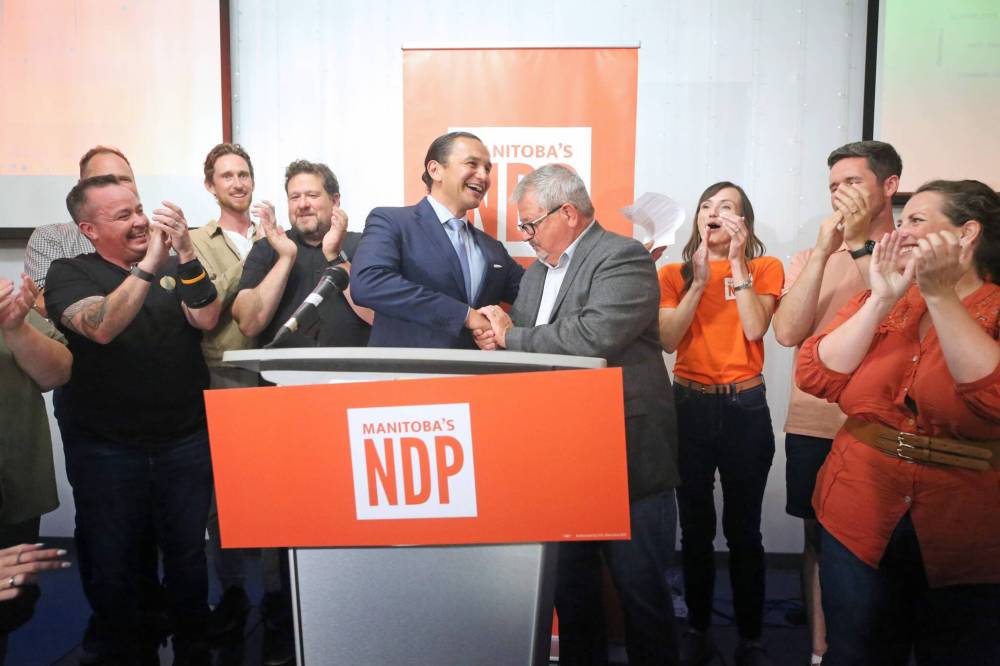Avoiding the byelection over-analysis trap
Advertisement
Read this article for free:
or
Already have an account? Log in here »
To continue reading, please subscribe:
Monthly Digital Subscription
$0 for the first 4 weeks*
- Enjoy unlimited reading on winnipegfreepress.com
- Read the E-Edition, our digital replica newspaper
- Access News Break, our award-winning app
- Play interactive puzzles
*No charge for 4 weeks then price increases to the regular rate of $19.00 plus GST every four weeks. Offer available to new and qualified returning subscribers only. Cancel any time.
Monthly Digital Subscription
$4.75/week*
- Enjoy unlimited reading on winnipegfreepress.com
- Read the E-Edition, our digital replica newspaper
- Access News Break, our award-winning app
- Play interactive puzzles
*Billed as $19 plus GST every four weeks. Cancel any time.
To continue reading, please subscribe:
Add Free Press access to your Brandon Sun subscription for only an additional
$1 for the first 4 weeks*
*Your next subscription payment will increase by $1.00 and you will be charged $16.99 plus GST for four weeks. After four weeks, your payment will increase to $23.99 plus GST every four weeks.
Read unlimited articles for free today:
or
Already have an account? Log in here »
Depending on which candidate, pundit or political party’s spinners you listen to, the results of last week’s Spruce Woods byelection — in which Progressive Conservative candidate Colleen Robbins narrowly defeated New Democrat Ray Berthelette — was either a breakthrough for the NDP that signals a landslide victory in the next provincial election, proof the Progressive Conservatives are a viable alternative to the NDP, or a sign of the Manitoba Liberal Party’s return to relevance.
Each of those claims should be viewed with skepticism, for several reasons.
Prior to last week’s byelection, the PC candidate had never received fewer than 61.81 per cent of votes cast in Spruce Woods in any election since the riding’s creation in 2011. The NDP candidate, on the other hand, had never received more than 28.62 per cent of votes. Given that multi-election history of Tory domination in the riding, it is far too soon to suggest last week’s outcome represents a permanent surge in voter support for the NDP in Spruce Woods, let alone among rural voters across the province.

Matt Goerzen/The Brandon Sun
Premier Wab Kinew shakes hands with Spruce Woods NDP candidate Ray Berthelette while supporters cheer following the party’s narrow second-place byelection finish last week.
The massive increase in the NDP’s vote share, combined with the sizable drop in the Tories’ vote share, is notable, but several factors point to the conclusion the byelection was a unique opportunity for the NDP that will be difficult to replicate in the next provincial election, scheduled for 2027.
Those factors include the reality that Robbins was an extremely weak candidate who was plagued by gaffes throughout the campaign. Those missteps cost her votes.
Beyond that, it is likely that support for the NDP in Spruce Woods, which includes a sizable portion of Brandon, was actually higher than previous election results suggested. In those elections, the NDP often ran “placeholder” candidates who did not seriously campaign in the riding, giving NDP supporters few reasons to bother taking the time to vote. That likely inflated the Tories’ margin of victory.
Two additional factors that likely played a tangible role in increasing the NDP’s vote share are the more than $300 million in spending commitments made by Premier Wab Kinew prior to and during the campaign, combined with the fact he was actively involved in the campaign on an almost-daily basis. Many NDP campaign signs featured his photo, not Berthelette’s.
Despite Kinew’s direct participation, personal popularity, all those spending promises and a determined ground game that included NDP caucus members, Berthelette was unable to defeat the mistake-prone Robbins. The riding was there for the taking, yet the NDP could not close the deal.
From the Tories’ perspective, they emerged with the win despite the NDP throwing everything it had at Robbins. To them, the outcome represents reassurance that their party still has a solid base of support and is within striking distance of winning the 2027 election.
That’s very optimistic thinking, but the party desperately needed good news and a loss (after losing the Tuxedo riding to the NDP last year) would have been devastating for fundraising, membership sales, candidate recruitment and caucus morale. The winning margin may have been tight, but they finally have a win against Kinew.
The Liberals can take solace that their candidate, Stephen Reid, was clearly the most articulate and polished of the three candidates, but he received just over seven per cent of votes cast in the contest. That’s a huge drop from the 14.19 per cent of votes the party’s candidate received in 2023, but he now says he is considering running for the Liberal Party’s vacant leadership position.
Interpretation of byelection results — let alone the extrapolation of that outcome toward a future election — is risky because they are events that often produce anomalous outcomes. That is often due to factors such as lower voter turnout than in general elections, the absence of hot-button campaign issues and the knowledge the outcome will not change the balance of power in the Legislative Assembly.
For that reason, it is reckless to over-emphasize the potential future impact of the results in last week’s Spruce Woods byelection. Two years is an eternity in politics and events will inevitably occur that impact support for the various parties. Given that reality, it is safer to say that Spruce Woods offered some summertime intrigue, but its outcome will have little impact going forward.
Deveryn Ross is a political commentator living in Brandon. deverynrossletters@gmail.com X: @deverynross


